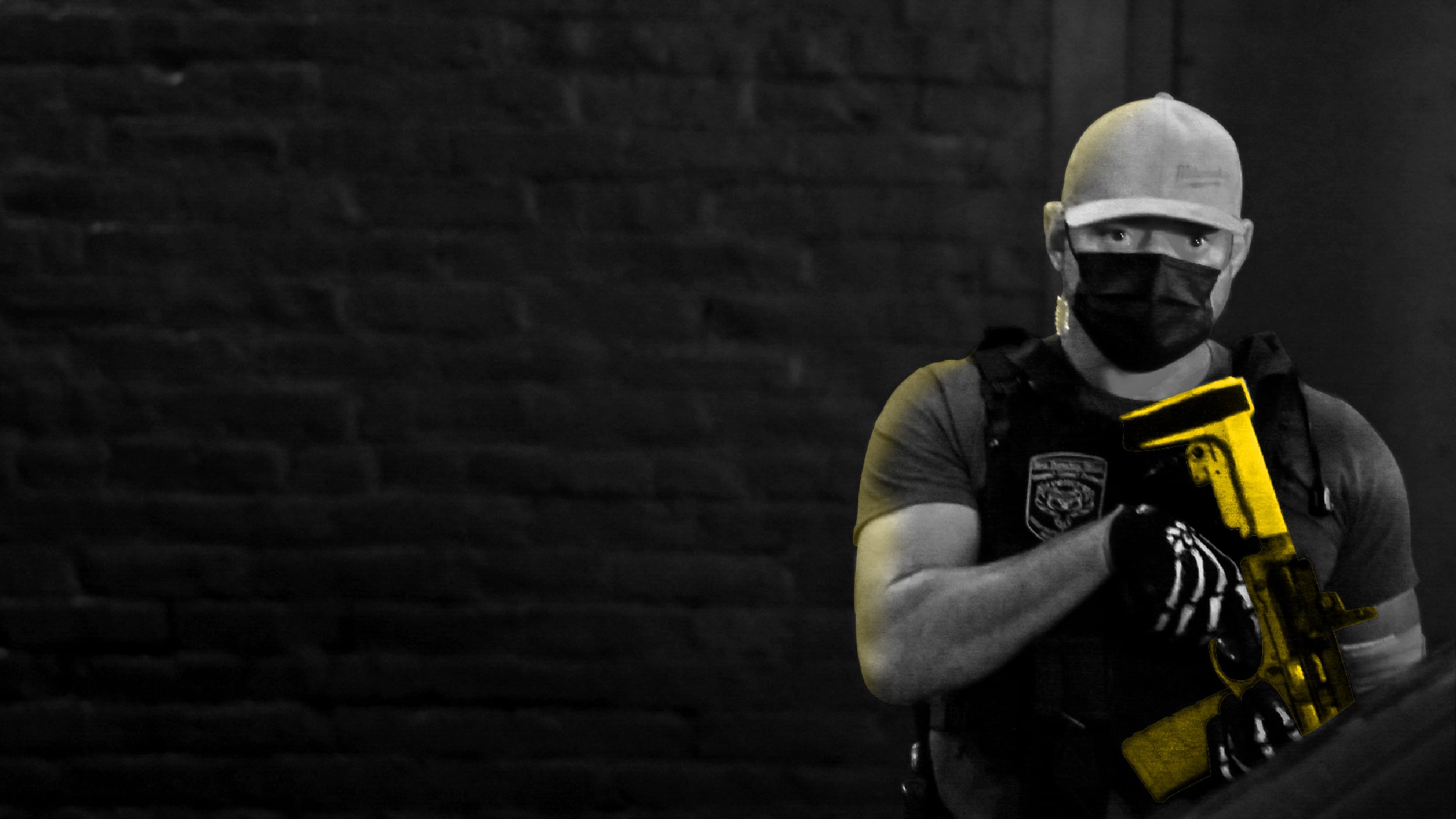It’s last call in Chinatown, and a crowd spills out of Shake Bar onto Northwest Couch Street—about 200 people stumbling, some looking for electric scooters, women barefoot and carrying their high heels.
The clubgoers are met by a heavily armed guard. He stands beneath the Hung Far Low sign, clad in a bulletproof vest and desert-tan tactical pants, with a 9 mm pistol strapped to his leg and an AR-15 semi-automatic rifle slung over his shoulder.
His name is Jean-Pierre LaFont. He’s a 45-year-old veteran who lives in Gresham. He says he did a tour of duty in Bosnia with the Navy SEALS. He’s 6 feet tall, wears black gloves outlined with white bones, and is delighted to talk about his work.
“My job is to get you home safe,” he says. “Unless you’re the perpetrator. The only way for evil to succeed is for good men to do nothing. So I’m going to do something.”
LaFont works for Ravencrest Force Protection Group. On the job, he goes by “Reaper.” His boss is codenamed “Ghost.” Their Northeast Portland firm bills itself as a private military contractor—the kind of firm that operates in war zones.
Their latest assignment: deployment to one block of Portland’s Old Town.
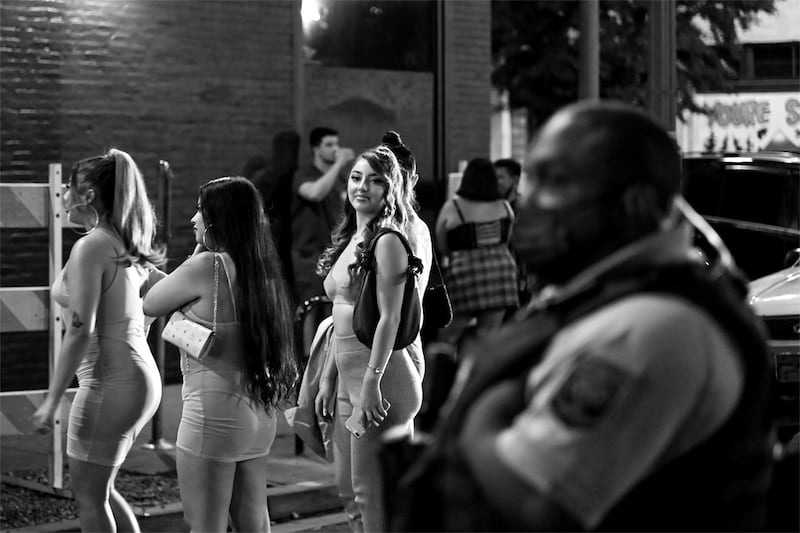
After a June shooting in the club’s doorway, Shake’s owners hired Ravencrest to secure not only the bar, but the length of Couch Street between 3rd and 4th Avenues.
Nearly two months later, LaFont patrols this street every Friday and Saturday night, trying to prevent the latest killing in what he describes as a gang war.
He finds the work gratifying. “I’d rather die with my boots on,” LaFont says, “than die in an old folks’ home hearing Christmas carols sung by Boy Scouts.”
Ravencrest is one of at least three companies with armed guards patrolling Old Town’s club scene.
Downtown Portland was defined last summer by squadrons of uniformed men equipped with tear gas and guns—federal agents, as well as police officers, sent to quell Portland’s racial justice protests.
This summer, armed men have returned to the downtown core, but for a different reason: to keep parties from turning into shootouts.
Their presence marks the confluence of club owners’ desire to reopen for business despite City Hall’s floundering attempts to grapple with the social upheaval that upended Portland after George Floyd’s murder in Minneapolis sparked months of protests and nationwide demands to defund police.
One of the results: a Portland Police Bureau that says it’s about 120 officers slimmer, bolstering demand for private security companies like Ravencrest.
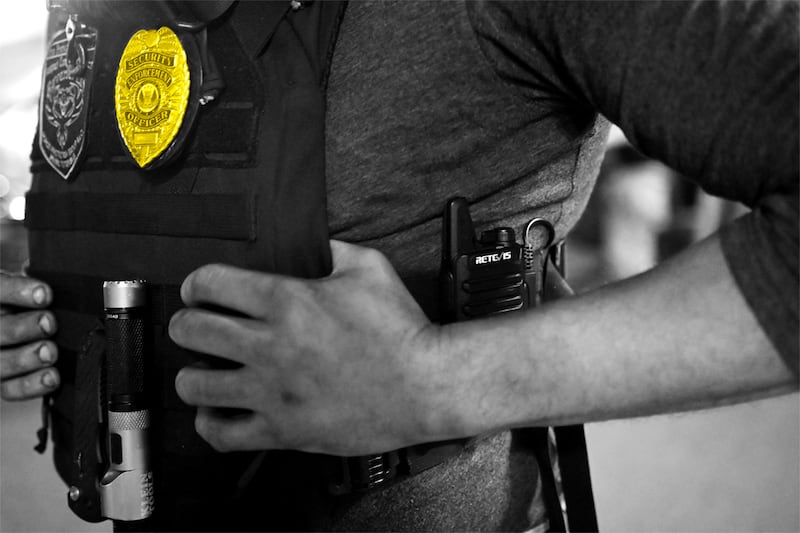
This spring, the city’s nightclubs reopened—in the midst of a wave of gunfire killing Black people at a rate seen nowhere else in the country (see “Worse Than Chicago”). Within days of reopening, bars in the city’s Entertainment District were packed. In fact, Old Town bar owners say July was their busiest month ever.
Amid the flourishing nightlife scene: many bullets. Less than a month after a gunman opened fire at Shake Bar, an 18-year-old woman was killed in front of a row of food carts in Old Town on July 17. The shooter wounded six others.
But amid the booming business and gun violence, the Portland Police Bureau hasn’t kept pace. Following last year’s budget cuts, the bureau last July dissolved its nightlife unit—the Central Precinct Entertainment Detail. Currently, only two Portland police officers are assigned to the neighborhood’s nightlife scene, compared to nine before, according to Police Bureau spokesman Lt. Greg Pashley.
Business owners and police alike say that’s insufficient.
“There aren’t enough police officers,” says Jessie Burke, co-owner of the Society Hotel and president of the Old Town Chinatown Community Association. She helped arrange the installation of street barricades to slow traffic, but says she wasn’t aware of a nightclub guard carrying a rifle. “We’re having to do what the government used to do. We’re kind of running an underground government to keep things safe.”
The decreased police presence created what business owners describe as a public safety vacuum. Private security companies arrived with rifles, metal detector wands and Kevlar vests.
The strategy alarms a police captain who once oversaw the Entertainment Detail.
“We’re there just to make sure that people are safe,” says Central Precinct Capt. Robert Simon. “And introducing an AR-15 into a group of drunks—it’s not the right tool for the application. We never did that.”
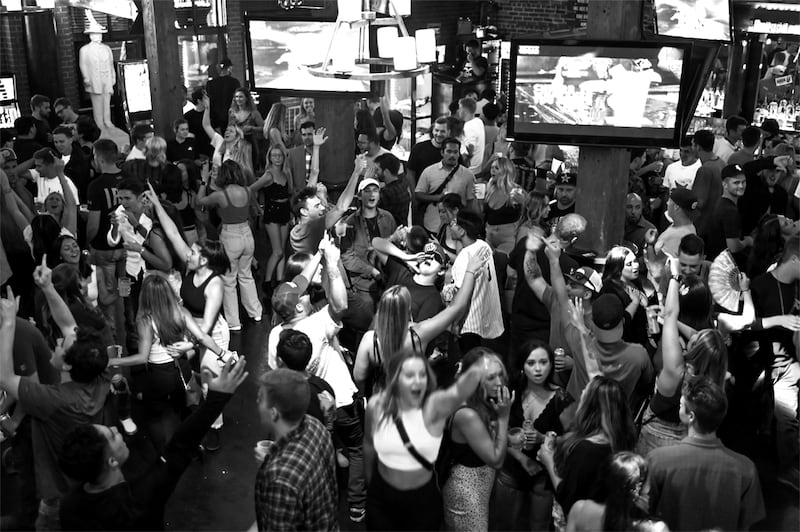
On Friday, Aug. 6, a line snakes around the exterior of Dixie Tavern at Northwest 2nd Avenue and Couch Street. Thumping bass emanates from inside, where rotating red and green spotlights shine on a crowded dance floor of mostly white college-aged revelers, sans masks, doing the “Cha-Cha Slide.”
More flock to the dance floor as Bon Jovi’s “Living on a Prayer” begins playing. When it comes time for the chorus, the DJ cuts the music and the crowd belts out the words of a song released in 1986—more than a decade before most of them were born.
“It’s not packed yet,” says Dan Lenzen, Dixie Tavern’s owner, gazing down at the dance floor from a second-level balcony.
Lenzen says July was a record month. He attributes the surge to a hunger among young people to be social and flirt after more than a year of isolation.
“You’ve got this jubilant feeling about getting out,” he said in an interview earlier that day. “People want to have fun.”
Across West Burnside Street, another crowd of young people flocks outside of Fuse Bar. This clientele is predominantly Black and Latinx.
Azim Patel, owner of Fuse Bar, agrees with Lenzen that pandemic fatigue is great for business.
“It’s Sociology 101,” Patel says. “You had a year when people couldn’t celebrate their birthdays. The whole zodiac.”
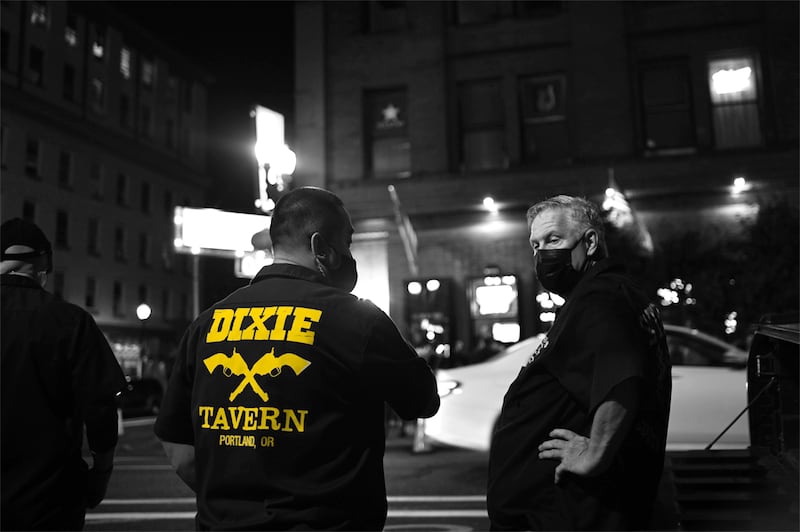
Beginning in 2012, the Portland Police Bureau staffed a unit specifically assigned to the nightlife scene.
Sam Adams, who was mayor during that time, implemented the city ordinance that paid for barricades around the Entertainment District. Adams, now director of strategic innovations in Mayor Ted Wheeler’s office, says the barricades, in addition to removing vehicles from the equation, helped prevent drunken skirmishes he describes as “bro bumping” by allowing clubgoers to walk in the street instead of squishing them onto crowded sidewalks.
The Entertainment Detail consisted of one sergeant and up to seven officers who patrolled outside Old Town nightclubs—which on weekend nights could draw 20,000 patrons, Lenzen says.
“That sergeant and those officers became experts, basically,” says Pashley. “It’s a specialty.”
The Entertainment Detail officers patrolled on foot within the barricade, and squad cars circled the perimeter. In addition, an officer was—and still is—assigned to patrol Old Town during the night shift, which lasts from 10 pm to 2 am.
During the day, Entertainment Detail officers often walked the neighborhood and chatted with business owners, who alerted them about upcoming events so law enforcement could anticipate and prepare for large, potentially rowdier crowds.
Then the COVID-19 pandemic hit. Downtown businesses went dark. And last summer, when most activity near the so-called Entertainment District consisted of racial justice protests, the Portland City Council slashed the Police Bureau’s budget by $15 million. One of the casualties, Pashley says, was the Entertainment Detail.
“We’re working with bare-bones staffing,” he says. “It’s like trying to paint a wall without enough paint.”
Bar owners and local neighborhood groups raised concerns about the decreased police presence during a mid-June meeting at Dixie Tavern with Capt. Simon, as well as the Central Precinct commander and a lieutenant. After this meeting, the Police Bureau reinstated one sergeant to the Entertainment District, Simon says, bringing the total to two.
Pashley says police in Old Town can call for backup from one of about 18 officers patrolling the Central Precinct, which encompasses about 41 square miles and over 200,000 people. But the bureau says those officers, too, are often busy responding to other calls.
“We’re at the point in the Police Bureau where any time we add staffing to a certain unit—say, the Entertainment Detail—we have to take it away from something else,” says Simon, the Central Precinct captain. “Do I cut my daytime bike team downtown to staff the Entertainment Detail?”
Old Town business owners hoped the Entertainment Detail would reappear in this year’s budget. That didn’t happen. They scrambled to replace it: As The Oregonian reported last week, Lenzen erected barricades without city permission, trying to keep cars from speeding past his nightclub.
“We defunded programs before we figured out what the replacement programs were,” the community association’s Burke says. “The city is in this decision-making spiral of Band-Aid on top of Band-Aid on top of Band-Aid.”
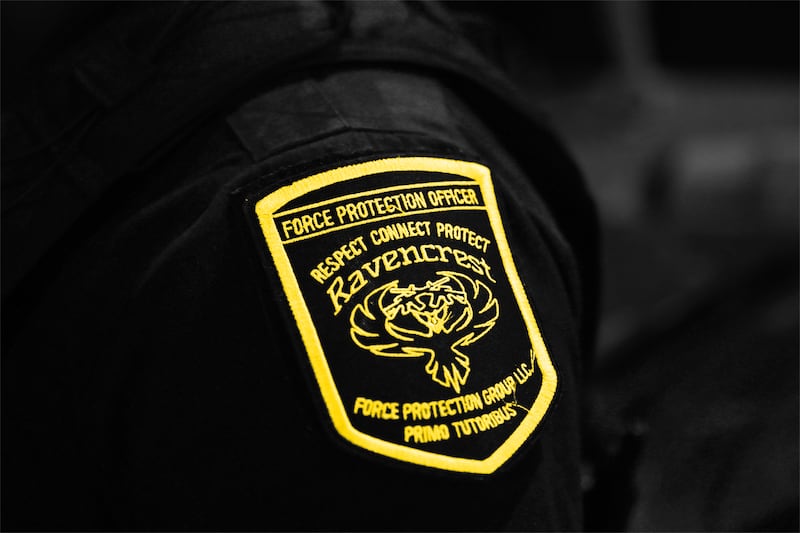
Among the scenes of violence: Shake Bar.
On June 25, a shooting at the nightclub’s entrance sent two people to the hospital. Police found 28 shell casings along Northwest Couch Street. Bullets struck eight vehicles. “It’s a mass murder, if anybody could shoot,” says Andrew Murdoch, who owns nearby nightclub District.
Jake Durighello was smoking a cigarette outside Shake Bar. “I heard nine shots, and they were shooting through the doorway,” he recalls. “I just started running.”
Related: Black Portlanders are more likely to be murdered than their peers in cities better known for crime.
Durighello, 25, is a photographer who takes portraits for event promoters at Shake. He says the club attracts people from across the city—some of whom are feuding online but wouldn’t typically encounter each other face to face.
“You have people from Northeast, Southeast, and you put ‘em all in a pit,” Durighello says. “Everybody’s intoxicated. You get the wrong crowd at any bar. This one just happens to be poppin’.”
State business filings show Shake was purchased in 2020 by a group called Band O’ Brothers LLC, whose registered agent was listed as Brian Lozano. He did not respond to calls from WW seeking comment.
In July, Shake hired Ravencrest Force Protection Group.
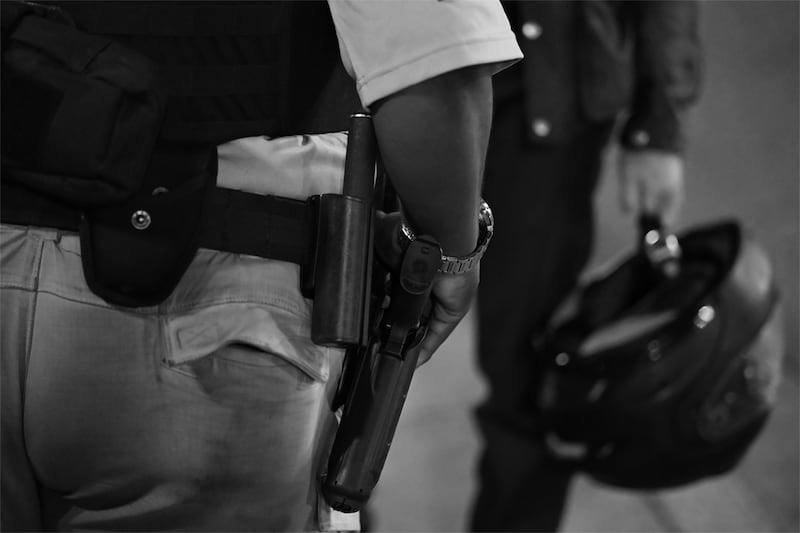
The patrons exiting Shake after last call on Aug. 6 appear nonchalant about the presence of a guard carrying a semi-automatic rifle. Perhaps it’s the alcohol. One young woman in a minidress walks up to LaFont and caresses one of his biceps. “Gorgeous, gorgeous,” she coos. “Handsome boy.”
LaFont’s boss Cory Webb stands several feet away, in the center of Couch Street, scanning the crowd for handguns.
“My eyes are twitching from looking at people’s hands,” he says. “We have to treat this almost like overseas. Keep your head on a swivel.”
Webb, 41, who uses the moniker “Ghost,” is an easygoing, portly man who stands 5-foot-6. In his spare time, he drift-races sports cars.
After an Army tour of duty in Iraq, Webb founded Ravencrest Force Protection Group in 2017, seeking to employ veterans who didn’t want to become police officers. “Some guys come out of the military tired of the government,” he says.
On its website, Ravencrest says it will send security teams in “tactical uniform” to protect businesses. “Within the limits of local and state law,” the site explains, “a uniformed security officer will take all responsible and necessary steps to protect persons and property, including the apprehension of suspects and the use of deadly force when necessary.”
But Webb says his men are loath to fire their weapons. Instead, he says, much of his squad’s task is to provide the appearance of order.
That includes pulling out the AR-15 at closing time. People leaving the club glimpse the gun, Webb says, and decide: “Oh shit, that’s a big-ass gun. I’d better get out of here.”
Ravencrest takes other precautions. As the club prepares to close at 1:30 am, Webb pulls a Mercedes ML350 SUV into the intersection. The vehicle has bulletproof doors, and Webb says people smoking cigarettes on the sidewalk can duck behind the vehicle if bullets fly.
Webb’s greatest concern: a surface parking lot across Northwest 4th Avenue from Shake. He says patrons leave their guns in vehicles parked in the lot, and if a fight breaks out, they run back to their cars and fire toward the club.
Ravencrest guards dub this parking lot “the Boneyard,” after a field of burned-out cars in Iraq where snipers would fire on U.S. soldiers. “This is our worst nightmare, this parking lot,” Webb says.
His team will pursue shooters across the road and into the maze of parked cars, he adds. But Webb has grown uneasy about this assignment.
“I wouldn’t be downtown,” he says, “if they weren’t paying us a king’s ransom.”
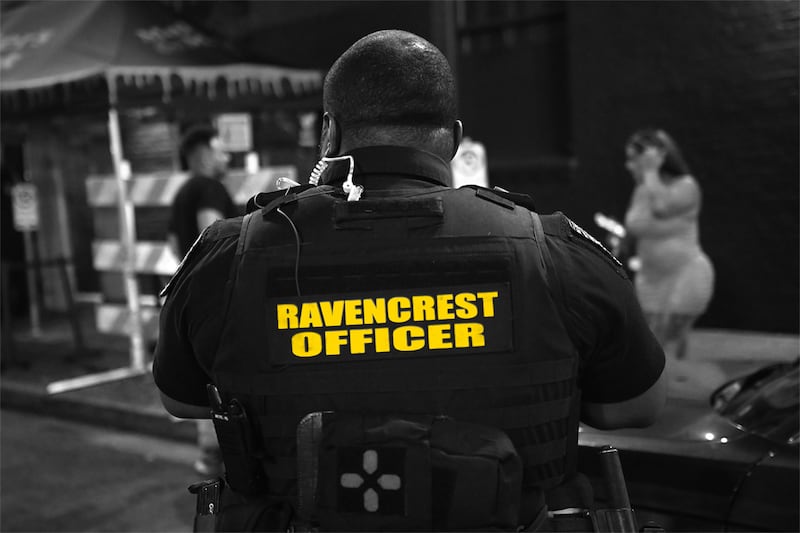
Others are skeptical that a security detail of armed ex-soldiers is the right tool for the job.
Lenzen, the Dixie Tavern proprietor, says his security team, which he trains in house, is unarmed. That’s for two reasons: First, Lenzen says, most shootings in the Entertainment District occur outside or from a drive-by vehicle. Second, he fears that a firearm in a crowded nightlife setting would injure bystanders.
“I worry about what’s potentially in the background,” he says. “When there’s an armed security officer and somebody’s shooting at them, what are they going to shoot back at?”
Portland police aren’t thrilled, either. Officers express concern that drunken clubgoers might not be able to distinguish between a cop and a guard.
“Some of the customers who may have a few libations or may be a little intoxicated—they might not understand the rules of engagement with these separate and different companies,” says Capt. Simon. “And that presents a lot of confusion, both for the patrons and for the owners: They don’t know what they’re getting and what they’re paying for. It’s in a weird spot down there right now.”
Private security guards in Portland occasionally use deadly force. On May 29, a guard for Cornerstone Security Group shot and killed 49-year-old Freddy Nelson Jr. at Delta Park Center, Oregon Public Broadcasting reported. And in 2019, a private security guard shot and killed 42-year-old Eugene Pharr Jr. outside the Dream On Saloon on Southeast Stark Street.
Simon says that prior to lockdown, he observed no more than two private security firms in the nightlife scene. Today, he says, there are about five: “Now it’s a little more fragmented.”
At least two additional security firms patrol downtown streets with guns. One of them, Portland Patrol, has long worked for the Portland Business Alliance and is authorized to carry weapons by a contract with the city.
The other, Echelon Protective Services, patrols Ankeny Alley—the pedestrian plaza outside Voodoo Doughnut. Its officers, dressed in blue uniforms, carry handguns in side holsters.
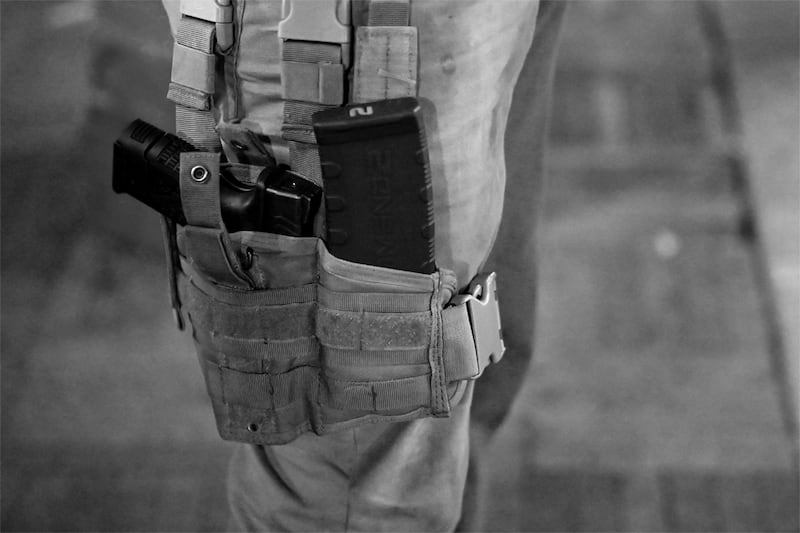
Echelon’s owner, Dustin Alex Stone—a former police officer in Clatskanie, Ore.—says his guards act as a deterrent. “It’s like a scarecrow in the field,” he says.
Stone characterizes Echelon’s work in part as “outreach” to the unhoused community. “That’s what security companies need to do,” he says. “They need to be helping people. Even just handing out a cigarette to somebody.”
Kaitlyn Dey, a homeless advocate with the Western Regional Advocacy Project, has tracked the expansion of private security in downtown Portland. She says Echelon has overstepped its boundaries by patrolling public streets.
“It seems like, increasingly, private security is starting to take over public space—which is a very alarming trend,” Dey says. “They don’t seem to be following any laws at all.”
In Oregon, private security guards receive certification from the same state agency that trains police: the Department of Public Safety Standards and Training.
Statewide, DPSST has certified 14,923 unarmed security guards who completed 14 hours of training, and 1,861 armed security guards who underwent an additional 24 hours of training.
But it is difficult to say how frequently state-certified private security guards use force of any kind. That’s because DPSST does not require incident reporting. Instead, it relies on complaints submitted by the public, police and the security companies themselves.
“A lot of individual companies really hold their employees accountable, and they do have them fill out those types of reports to keep them on file,” says Michelle Morrison, a certification and licensing background investigator with the agency. “We can’t be out and everywhere.”
DPSST can investigate complaints and revoke certifications of individual security workers who violate rules, Morrison says, but it cannot yet penalize private security firms that have a pattern of bad practices.
In response to a public records request from WW, DPSST says neither Echelon nor Ravencrest have generated complaints, but that “there are open and active professional standards complaints against the executive managers for these companies.”
Morrison says the agency discourages certified private security staff from wearing uniforms or driving vehicles that resemble law enforcement.
Oregon has no rules about the types of firearms that guards may carry, she adds.
Sam Adams says he understands why Old Town and Chinatown bars have resorted to hiring private security, but he is concerned about the open display of firearms.
“It is startling to see people carrying weapons out,” he says. “I don’t think it’s necessary to show that kind of level of force. It makes people unnecessarily nervous and it’s counterproductive. You don’t have to have that display of armament.”
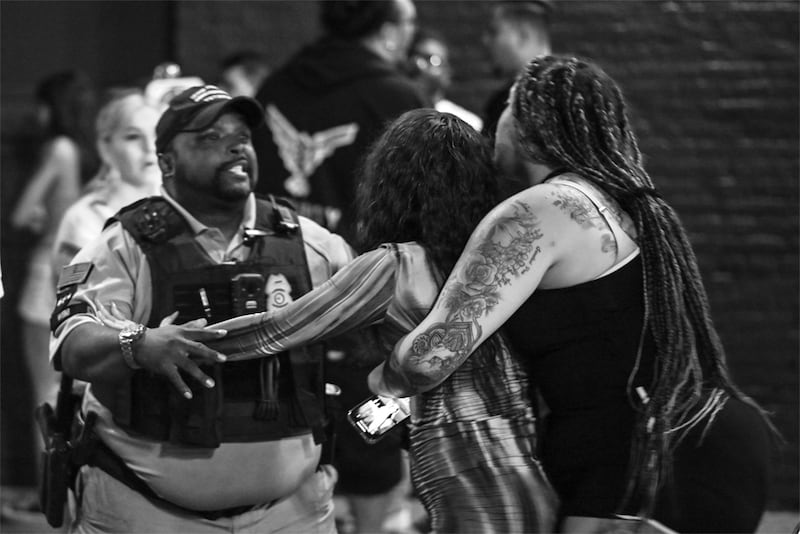
In the early hours of Sunday, Aug. 8, it happens: a fight breaks out inside Shake.
A woman in a striped jumpsuit is hauled out of the club by one of her friends, screaming curses and demanding to go back inside. Soon, the Ravencrest guards are trying to clear her and her friends from Couch Street.
Webb pulls an orange, non-lethal pepper gun from a pouch in his vest and points it at a young man in a yellow silk shirt who refuses the leave the road. The man salutes Webb, sneering.
As his friends try to pull him away from the guards, he leans over the street barricades and says, slowly and ominously: “You know what’s been going on.”
What’s been going on, for months, is bloodshed in the streets of Portland. In that context, Webb and LaFont view the young man’s meaning as unmistakable: He’s threatening to kill them.
Ravencrest calls the cops. Two Portland police officers arrive and move a squad car with flashing lights into the intersection, announcing they’ll search the perimeter once the bar empties. One officer glances at LaFont’s rifle: “You’re more outfitted than me right now,” he says.
Thirty minutes later, a burst of gunfire comes from the direction of the Boneyard. Four shots: pop-pop, pop-pop.
Police officers rush, guns drawn, up Northwest 4th Avenue. LaFont levels his AR-15, aiming into the night. The crowd keeps milling in the street, edgy but not leaving. A Shake patron tugs on LaFont’s vest, trying to get his attention.
“Get the fuck out of here!” LaFont shouts. “There are people shooting!”
Minutes later, LaFont lowers his rifle and lights a cigarette. He’s upset—not just by the gunfire but by the people ignoring it. His eyes are wide and he looks like he’s about to cry.
“This once was a great city,” he says. “This is a great city. It’s the best. We just forgot.”
